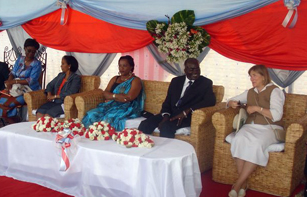
L to R: United Nations Resident Coordinator Rosine Cori Coulibaly, UNAIDS Regional Director for West and Central Africa Meskerem Grunitzky-Bekele, Minister of Health and Fight against HIV/AIDS, Dr Sabine Ntakarutimana, 2nd Vice President of Burundi Gervais Rufyikiri, US Ambassador to Burundi, Pamela Slutz.
Burundi is a small densely populated country located in sub-Saharan Africa with an HIV prevalence of 2.97% among the general population. It is also one of 22 countries worldwide that has contributed to the development of and signed up to implement the Global Plan towards the elimination of new HIV infections among children by 2015 and keeping their mothers alive.
In an effort to inform and mobilize the general population about the possibility of a new Burundian generation free of HIV, the Government of Burundi spearheaded a national launch of the Global Plan at the end of October.
Classified as a low-income country, Burundi’s economy has been highly affected by a long period of civil war, which has had a significant impact on sanitation, infrastructure and human development. In this context, preventing new HIV infections among children has been one of the country’s main challenges, with coverage of HIV services reaching only 30% of pregnant women at the end of 2010. To effectively respond to this challenge, Burundi has developed a national plan for the period of 2011-2015 in accordance with the Global initiative.
Every man should accompany his wife to pre-natal consultation and jointly with her, request an HIV test
His Excellency the 2nd Vice President of Burundi Gervais Rufyikiri
“Every man should accompany his wife to pre-natal consultation and—jointly with her—request an HIV test,” stated His Excellency the 2nd Vice President Gervais Rufyikiri during the launch. “Engagement of men is key to the success of this initiative,” he added.
The U.S. Ambassador to Burundi, Pamela Slutz, emphasized that in order to help the Burundian government eliminate new HIV infections among children, the U.S. Government, through the President’s Emergency Plan for AIDS Relief (PEPFAR), had dedicated US$ 10 million exclusively for the implementation of such programmes in the country.
Speaking at the launch, the Minister of Health and Fight against HIV/AIDS, Dr Sabine Ntakarutimana said that activities like family planning reproductive health and HIV will be harmonized and articulated in the health system to promote efficient results.
UNAIDS Regional Director for West and Central Africa, Dr Meskerem Grunitzky-Bekele, who represented the UNAIDS Executive Director at the launch, highlighted that Burundi understood the need to act now. “The price to be paid for the country’s inaction will be too high for future generations,” she said.
This Global Plan provides the foundation for country-led movement towards the elimination of new HIV infections among children and keeping their mothers alive. The Global Plan was developed through a consultative process by a high level Global Task Team convened by UNAIDS and co-chaired by UNAIDS Executive Director Michel Sidibé and United States Global AIDS Coordinator Ambassador Eric Goosby. It brings together 30 countries and 50 civil society, private sector, networks of people living with HIV and international organizations to chart a roadmap towards achieving this goal by 2015.




